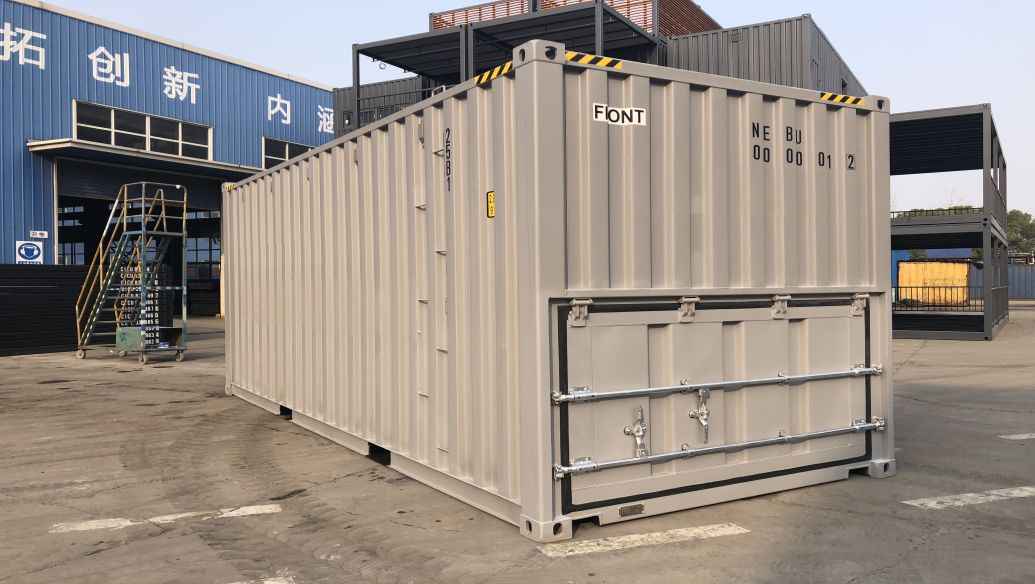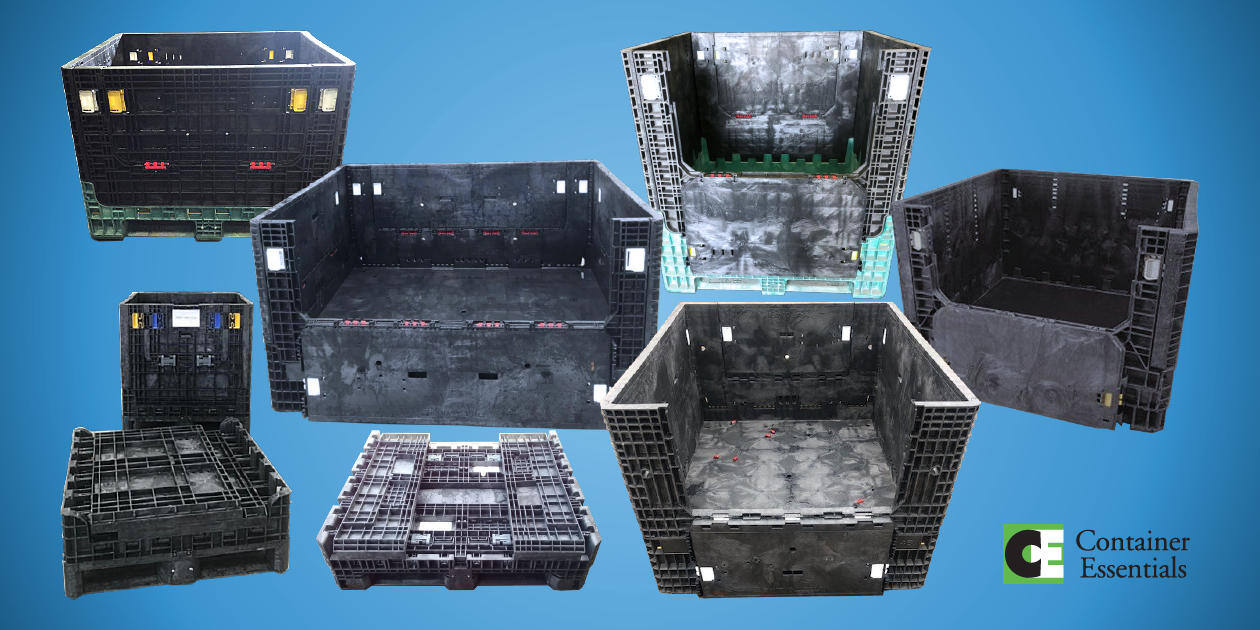Why Mass Containers Are Essential for Economical and lasting Transport
Mass containers play a vital function in contemporary logistics. They assist in the effective motion of large quantities of items, consequently optimizing transport procedures. This technique not only decreases expenses but also minimizes environmental impact with reduced discharges and waste generation. As markets look for more lasting techniques, the fostering of bulk containers is ending up being significantly considerable. What effects does this change hold for future logistics and supply chain administration?

The Advantages of Utilizing Bulk Containers in Logistics
Mass containers revolutionize logistics by enhancing efficiency and sustainability. These containers enable the transport of huge quantities of goods in a single trip, noticeably lowering the number of trips required. This not only simplifies procedures yet additionally lessens labor prices connected with handling, packing, and discharging. In enhancement, mass containers are designed to optimize area usage within transport cars, making sure that more products can be delivered all at once.
The standardization of bulk containers also streamlines the logistics procedure. With uniform dimensions, they can be easily piled and saved, bring about boosted storage facility administration. Furthermore, bulk containers frequently feature durable products that secure contents from damage during transportation, thereby lowering item loss and increasing total reliability. As a result, businesses can experience boosted supply chain performance, inevitably causing raised earnings and customer satisfaction. This mix of elements makes mass containers a vital possession in modern logistics.
Ecological Impact: Reducing Waste and Carbon Footprint
As sectors progressively focus on sustainability, the adoption of bulk containers has become a crucial strategy for minimizing waste and lowering carbon footprints. These containers decrease making use of product packaging products, such as boxes and plastic, thereby especially reducing general waste generation. By combining deliveries, mass containers enhance transport effectiveness, permitting more items to be carried per journey. This decrease in journeys directly associates with reduced greenhouse gas exhausts, contributing to a smaller carbon footprint.
In addition, bulk containers can commonly be reused or recycled, even more minimizing ecological impact. The sturdiness of these containers assurances they can hold up against multiple transport cycles, reducing the requirement for single-use choices. used collapsible bulk containers. By streamlining logistics and advertising efficient source use, bulk containers not only support sustainable practices but also encourage sectors to straighten with international ecological objectives. Inevitably, their execution mirrors a commitment to environmental stewardship and liable source administration
Expense Financial Savings: Just How Mass Containers Lower Transportation Expenses
While several firms look for means to enhance their lower line, using mass containers offers a substantial chance for lowering transport expenditures. Bulk containers optimize the volume of products delivered, enabling services to deliver larger amounts at when. This performance decreases the number of journeys needed, directly lowering gas costs and minimizing labor expenditures connected with loading and dumping.
Additionally, mass containers commonly feature structured styles that maximize area utilization within transportation vehicles. This suggests fewer voids, causing much more reliable use of readily available capacity. In addition, the sturdiness of bulk containers can decrease the danger of product damages during transportation, guaranteeing and reducing losses that even more items show up undamaged.
Enhancing Supply Chain Performance With Bulk Storage Solutions
Bulk storage remedies play a vital function in boosting supply chain efficiency by enhancing supply monitoring. By consolidating products into less, bigger containers, services can considerably minimize managing costs associated with frequent transfers and handling. This streamlined technique permits for far better monitoring and management of inventory, ultimately resulting in enhanced operational performance.
Streamlined Inventory Management
Effective inventory management is vital for optimizing supply chain procedures, specifically when companies take on bulk storage services. These services allow companies to maintain greater supply degrees while reducing the regularity of replenishment. By settling products into bulk containers, companies can improve their supply processes, lowering the intricacy associated with tracking multiple smaller bundles. This approach assists in accurate inventory counts and enhances projecting accuracy, permitting even more informed decision-making. On top of that, mass storage space services simplify storage facility company, making it simpler to situate and gain access to items when required. Therefore, companies can accomplish an extra effective inventory turnover price, eventually enhancing total supply chain performance and reducing the chance of stockouts or overstock situations.

Reduced Handling Expenses
The execution of bulk storage solutions not only enhances supply management yet additionally significantly minimizes handling expenses across the supply chain. By combining products right into bulk containers, firms decrease the need for frequent handling and transfer between various storage and transportation systems. This technique lowers labor prices connected with loading, unloading, and moving smaller bundles. Additionally, bulk storage minimizes the regularity of deliveries, bring about lower transportation costs and lowered fuel intake. Consequently, companies can maximize their logistics operations, permitting for a more effective allotment of resources. Eventually, decreased managing expenses add to enhanced overall supply chain performance, fostering a setting that sustains both sustainability and financial feasibility.

Adaptability of Bulk Containers Throughout Various Industries
Several markets have distinct demands for transportation and storage, bulk containers have arised as a versatile service that satisfies a large array of demands. These containers, varying from huge containers to specialized containers, can fit varied products, consisting of powders, liquids, and granules. In the farming field, mass containers help with the transportation of grains and plant foods, while the food and drink sector uses them for active ingredients and finished items. The chemical sector depends on mass containers for safely delivering harmful materials, making sure conformity with security guidelines. Furthermore, building firms gain from mass containers for moving accumulations and other products. Their flexibility reaches different modes of transport, consisting of ships, trains, and vehicles, boosting logistical effectiveness. This flexibility not only enhances operations throughout various sectors yet likewise promotes sustainability by lowering packaging waste and optimizing room in transit. Bulk containers play an important duty in contemporary supply chain management.
Future Fads in Bulk Container Use and Sustainability
The future of mass container usage is significantly shaped by cutting-edge materials growth that enhances sustainability. Furthermore, automation in logistics promises to enhance operations, minimizing waste and improving performance. Embracing round economic situation techniques will further reinvent how bulk containers are created, made use of, and recycled, fostering a more sustainable transportation landscape.
Innovative Products Growth
As industries significantly focus on sustainability, innovative materials advancement wholesale containers emerges as a considerable variable in boosting green transport services. Manufacturers and scientists are discovering eco-friendly plastics, recycled composites, and light-weight metals to decrease environmental impact. These materials not just decrease waste but also improve gas performance by decreasing the total weight of containers. In addition, developments in clever materials, which can adapt to varying problems, improve the durability and functionality of bulk containers. The integration of these innovative products straightens with round economic situation principles, promoting reuse and recycling. As the demand for sustainable practices expands, the growth click here of such products will certainly play a crucial function fit the future of bulk container use in logistics and transport.
Automation in Logistics
Significant advancements in automation are poised to transform logistics and the utilization of bulk containers, enhancing sustainability in transportation. Automated systems, consisting of drones and self-governing automobiles, are streamlining the motion of mass containers, lowering the dependence on traditional fuel-powered transportation. These innovations maximize routing and filling procedures, boosting and lessening empty miles gas effectiveness. Additionally, automated supply administration systems enhance monitoring and tracking of bulk containers, making certain much better resource appropriation and decreased waste. The integration of the Web of Things (IoT) enables real-time information analysis, making it possible for positive decision-making that aligns with sustainability objectives. As automation proceeds to progress, it is expected to drive further advancements wholesale container use, eventually supporting even more lasting logistics methods and lowering the environmental effect of transportation.
Circular Economy Practices
Improvements in automation are establishing the phase for a much more incorporated approach to circular economic situation practices in the domain of mass container use. As industries progressively welcome sustainability, mass containers are being created for longevity and reusability. This shift not just reduces waste yet likewise boosts resource performance. Companies are embracing strategies such as closed-loop systems, where used containers are accumulated, reconditioned, and reestablished into the supply chain. Furthermore, smart innovations track container life process, assisting in far better administration and lowering environmental effect. The collaboration in between makers, logistics service providers, and end-users is vital in establishing requirements for sustainable container use. used collapsible containers. Future fads show an expanding focus on products that are recyclable and eco-friendly, more enhancing the circular economic climate's concepts in bulk transportation

Often Asked Concerns
What Products Are Bulk Containers Normally Made From?
Mass containers are typically constructed from sturdy products such as high-density polyethylene, aluminum, steel, and cardboard. These products supply defense, convenience, and toughness, making them suitable for carrying numerous items in various sectors successfully.
Just how Do I Pick the Right Dimension Mass Container?
Selecting the ideal size bulk container involves evaluating the volume of products to be transported, considering handling tools compatibility, and evaluating storage area demands. Appropriate size warranties performance in transport and decreases waste throughout delivery.
Are Bulk Containers Reusable or Recyclable?
Bulk containers are typically recyclable, created for numerous journeys, boosting sustainability. Lots of can also be reused, relying on the materials used. Choosing recyclable options additionally supports ecological objectives and minimizes waste in transportation methods.
What Security Laws Relate To Bulk Container Transport?
Security policies for mass container transportation consist of conformity with the Division of Transport standards, correct labeling of unsafe materials, architectural integrity analyses, and adherence to weight restrictions to ensure risk-free handling and avoid accidents throughout transportation.
Exactly How Can Businesses Change to Utilizing Bulk Containers Properly?
Organizations can alter to bulk containers by reviewing current logistics, educating team on handling, buying appropriate equipment, maximizing supply administration, and working together with providers to assure compatibility and effectiveness throughout the supply chain.
As industries increasingly prioritize sustainability, the fostering of bulk containers has actually arised as a key technique for lowering waste and lowering carbon footprints. By combining products right into mass containers, firms can enhance their supply procedures, lowering the complexity associated with tracking several smaller bundles. As markets significantly focus on sustainability, cutting-edge materials development in bulk containers emerges as a considerable aspect in improving green transportation remedies. Automated systems, consisting of drones and autonomous lorries, are streamlining the motion of bulk containers, minimizing the dependence on standard fuel-powered transportation. Furthermore, automated stock administration systems improve tracking and tracking of bulk containers, guaranteeing better resource allocation and reduced waste.